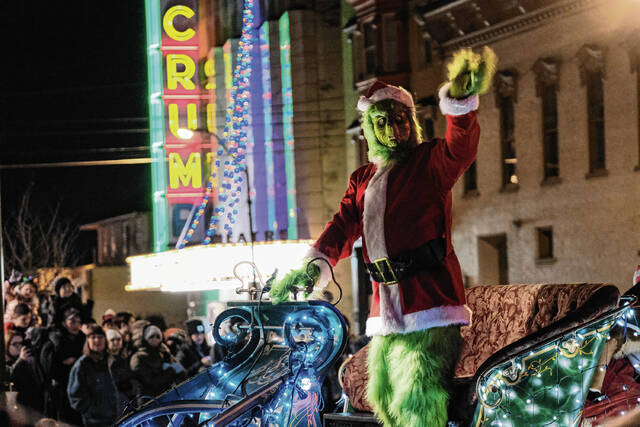
Mike Wolanin | The Republic The Grinch waves to spectators as he rides a sleigh through the intersection of Third and Washington streets during the 30th annual Festival of Lights parade in Columbus, Ind., Saturday, Dec. 4, 2021.
COLUMBUS, Ind. — The popular Festival of Lights Parade that has attracted 7,000 to 10,000 people each year has gone dark.
Organizers with JAKKS Inc. announced on the website festivaloflightsparade.org the end of the popular early December event due to a lack of volunteers, increasing vendor costs, concerns about safety, and the rise in liability and related insurance.
Joyce Lucke, the parade spokesperson since 2009, mentioned that if others want to step forward to take on the task that she said requires 500 hours of volunteerism from a team of at least a dozen people, “then good luck to them.”
She mentioned that most of the current organizers are age 60 plus, and are tired.
“We made many efforts to find others,” Lucke said. “But many of them have said that they want to watch the parade rather than spend so much time behind the scenes.”
She said she has been aware for some time that “parade liability today is just insane.” She said that’s especially true after tragedies in places such as in Waukesha, Wisconsin. On Nov. 21, the driver of a sport utility vehicle killed six people and injured 62 others by hitting participants and observers at the annual Christmas parade.
Safety issues of another variety surfaced here along the mile-long route, too.
Locally, organizers were vocal and frustrated after the 2019 downtown event in which onlookers stepped far into the street at Fifth and Washington streets so much that float entries struggled to pass. Lucke said then that such behavior could not be tolerated. She was told that a marching band parade entry had to break formation in order to pass.
Plus, there were reports that onlookers were rude and defiant to security personnel when told that they had to stay on the sidewalk and out of the way of passing entries that included semi-trucks.
“We’re glad that we’ve been able to do the parade all this time,” Lucke said of the usual 100-entry event that stretched about 90 minutes. “But we just can’t do it anymore.”
For more on this story, see Sunday’s Republic.




